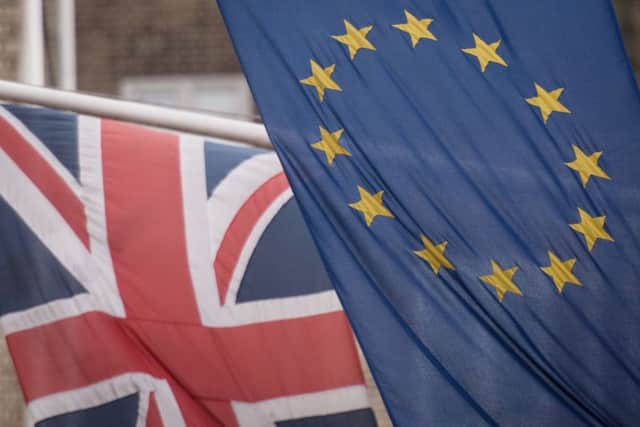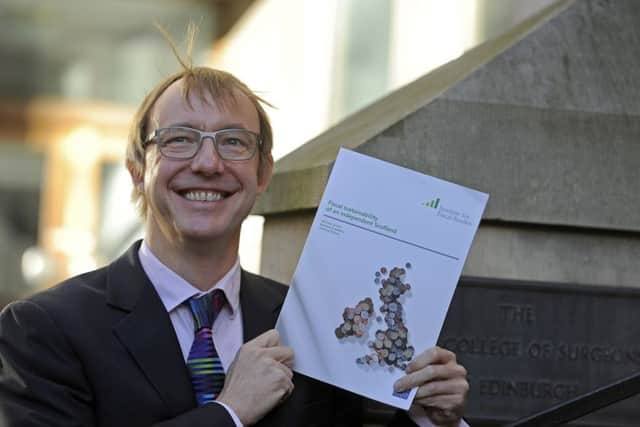Institute for Fiscal Studies rejects EU 'propaganda arm' label
This article contains affiliate links. We may earn a small commission on items purchased through this article, but that does not affect our editorial judgement.


The Institute for Fiscal Studies said Britain could face two more years of austerity if there is a Leave victory in the June 23 referendum.
Researchers warned that the UK Government may extend its austerity drive after a Brexit vote as it grapples with a fall in national income and a sharp rise in public sector borrowing.
Advertisement
Hide AdAdvertisement
Hide AdPrime Minister David Cameron - whose policies have often been savaged by the IFS - said it was “always held out as the independent gold standard”.


“What they are saying about the £350 million claim and what they are saying about the effect upon our economy of Brexit, that is very, very powerful and it backs up what the Treasury and others have been saying,” he said as he arrived in Japan for the G7 summit.
The report said a vote to Leave could see public finances take a £20 billion to £40 billion hit in 2019/20, if gross domestic product is 2.1% to 3.5% lower over the period, as predicted by the National Institute of Economic and Social Research (NIESR).
Paul Johnson, IFS director and an author of the report, said: “Getting to budget balance from there, as the Government desires, would require an additional year or two of austerity at current rates of spending cuts.”


The IFS said Britain could use its contribution to the EU - estimated at £8 billion a year - to help shore up its finances if it voted for Brexit. But it said this could be overshadowed by the negative impact on the UK economy, with a 0.6% fall in national income offsetting the benefits.
It also dismissed claims from the Leave camp that the UK would have an extra £350 million a week to spend if it headed for the European exit door, while the saving from leaving the EU would be halved if it followed Norway and joined the European Economic Area.
Vote Leave dismissed the IFS as a “paid-up propaganda arm of the European Commission” which could suffer a financial hit from Brexit because it benefits from EU funds.
“The IFS is not a neutral organisation. It would face an £800,000 deficit if we vote Leave,” the campaign said.
Advertisement
Hide AdAdvertisement
Hide AdIn 2014, 11% of the think-tank’s research funding came from the EU and it has received more than 7.4 million euros (£5.6 million) from European Commission sources since 2009, Vote Leave said.
Mr Johnson told BBC Radio 4’s Today programme that the think-tank received European funding for some of its “academic work” - as did other institutions outside the EU.
He said: “For the last 30 years, the IFS has built its reputation on the independence and integrity of our work and actually there is no sum of money from anywhere in the world which would influence what we said because, if it did, then the point of the IFS and the reasons ... that we are listened to after budgets and so on would simply be lost.”
The IFS report - funded by the Economic and Social Research Council’s UK in a Changing Europe scheme - said a vote to Leave would increase economic uncertainty in the short term, ramp up the cost of trade and make the UK less attractive to foreign investment.
It said these pressures could see borrowing come in more than £20 billion higher in 2019, if national income falls in line with NIESR’s prediction of a 2.1% drop over that period.
It found that the Government would have to find the equivalent of £5 billion of public spending cuts, £5 billion of savings from social security spending and roll out £5 billion of tax rises if it wanted to balance the books by 2019/20.
Chancellor George Osborne has pledged to return the UK to a surplus by 2020, with the Office for Budget Responsibility forecasting that the UK would have a budget surplus of £10.4 billion in 2019/20 and £11 billion the year after.
Patrick Minford, co-chairman of Economists for Brexit, said: “The IFS analysis acknowledges that the unilateral free trade approach recommended by Economists For Brexit would be the best option for the UK following an exit from the EU.
Advertisement
Hide AdAdvertisement
Hide Ad“The IFS comments that it is ‘politically difficult’ to embark on this WTO (World Trade Organisation) path. Yet this is entirely irrelevant for what is a purely economic argument.”
But Mr Johnson said the kind of economy envisaged by Prof Minford would involve “very substantial” costs during the transition process, with the loss of much of the UK’s manufacturing industry.
Brexit-backing Tory former cabinet minister John Redwood told Today: “I think the IFS are part of this cosy establishment which desperately wants to keep us in the European Union.”
DOWNLOAD THE SCOTSMAN APP ON ITUNES OR GOOGLE PLAY